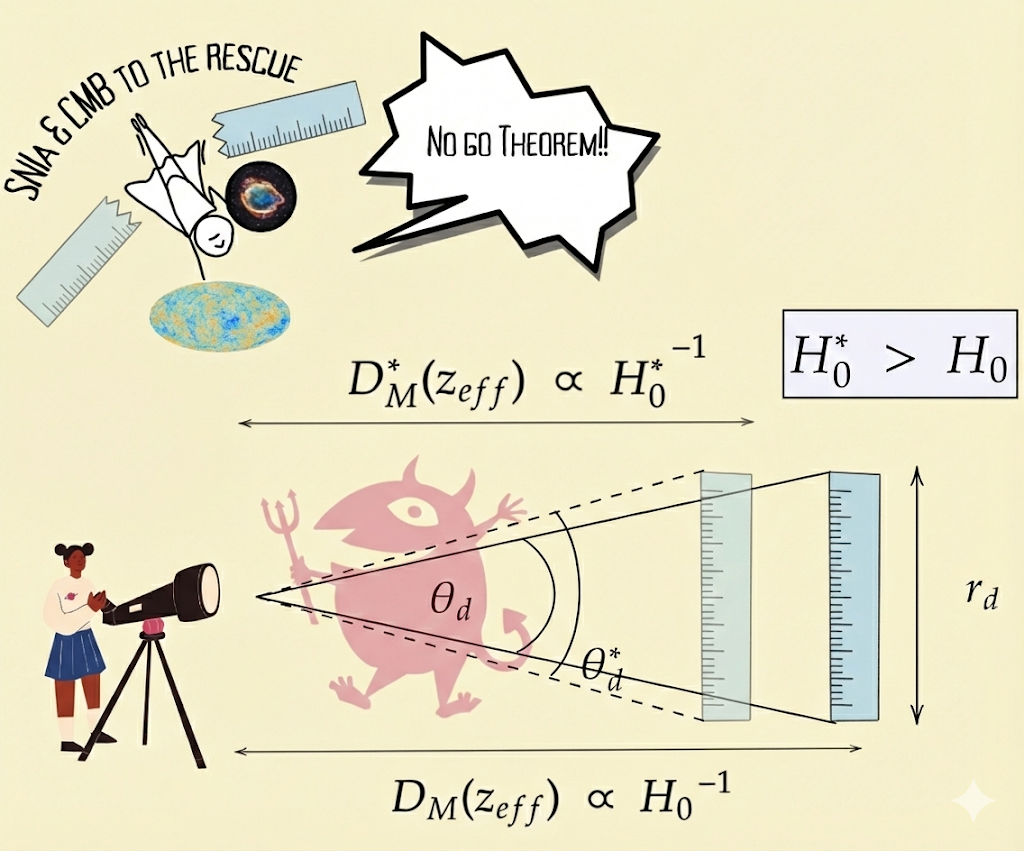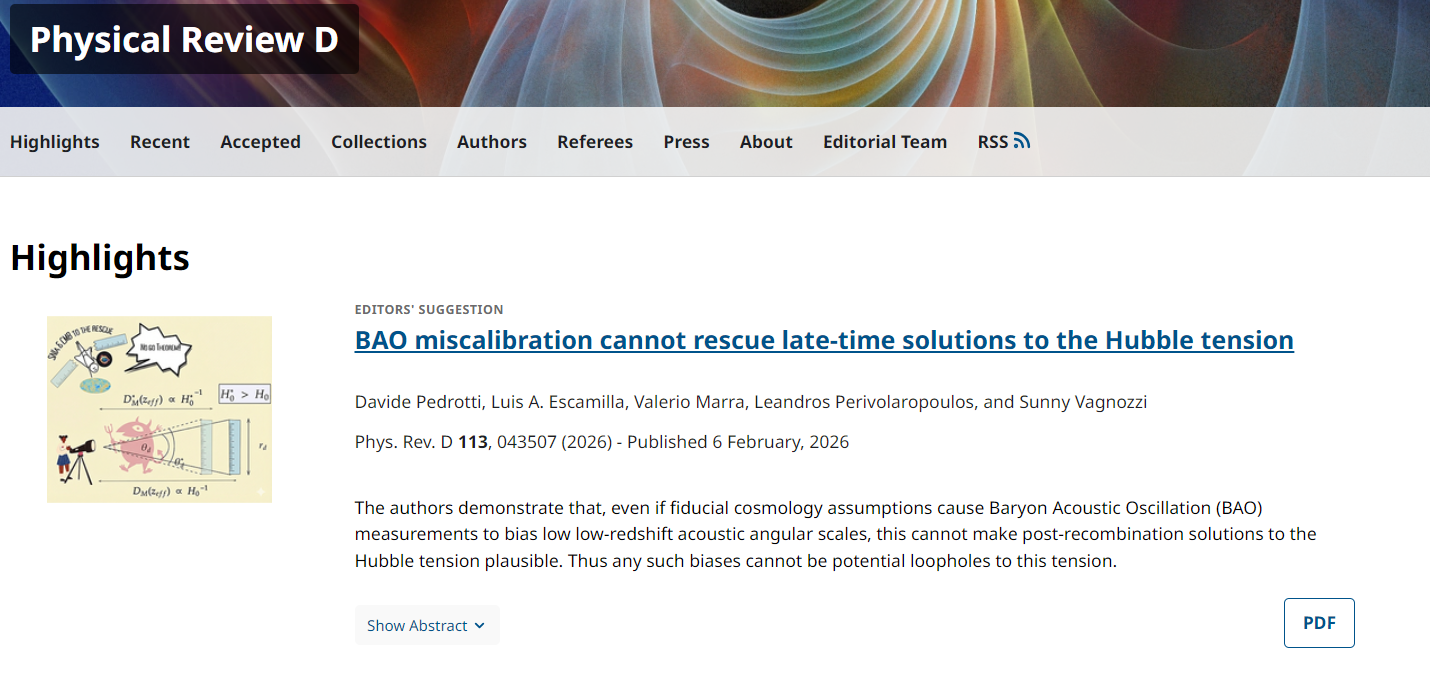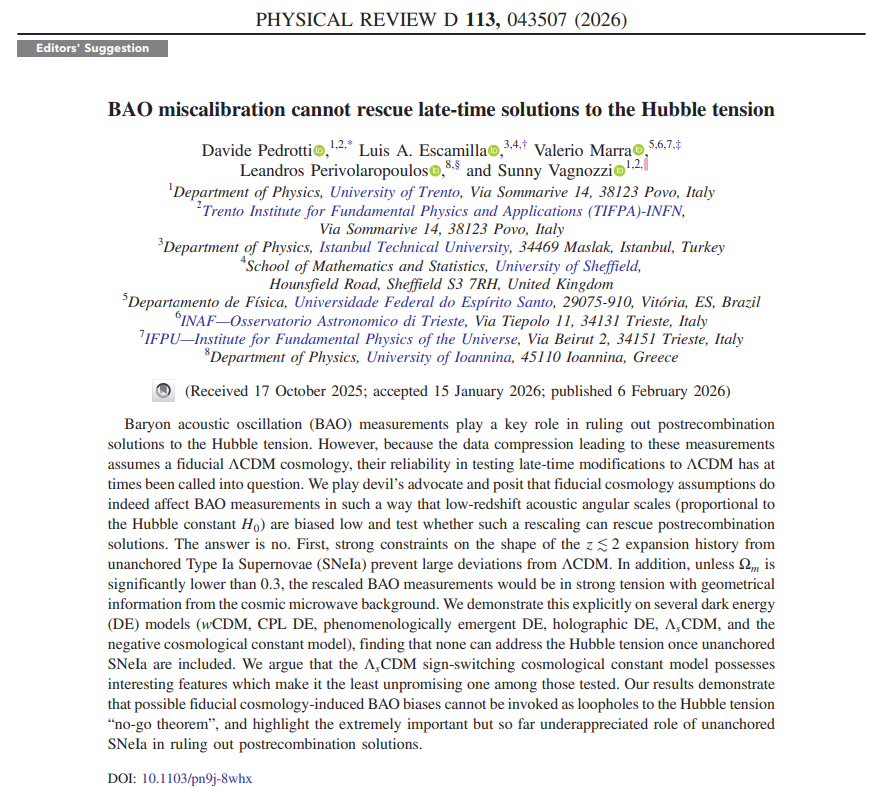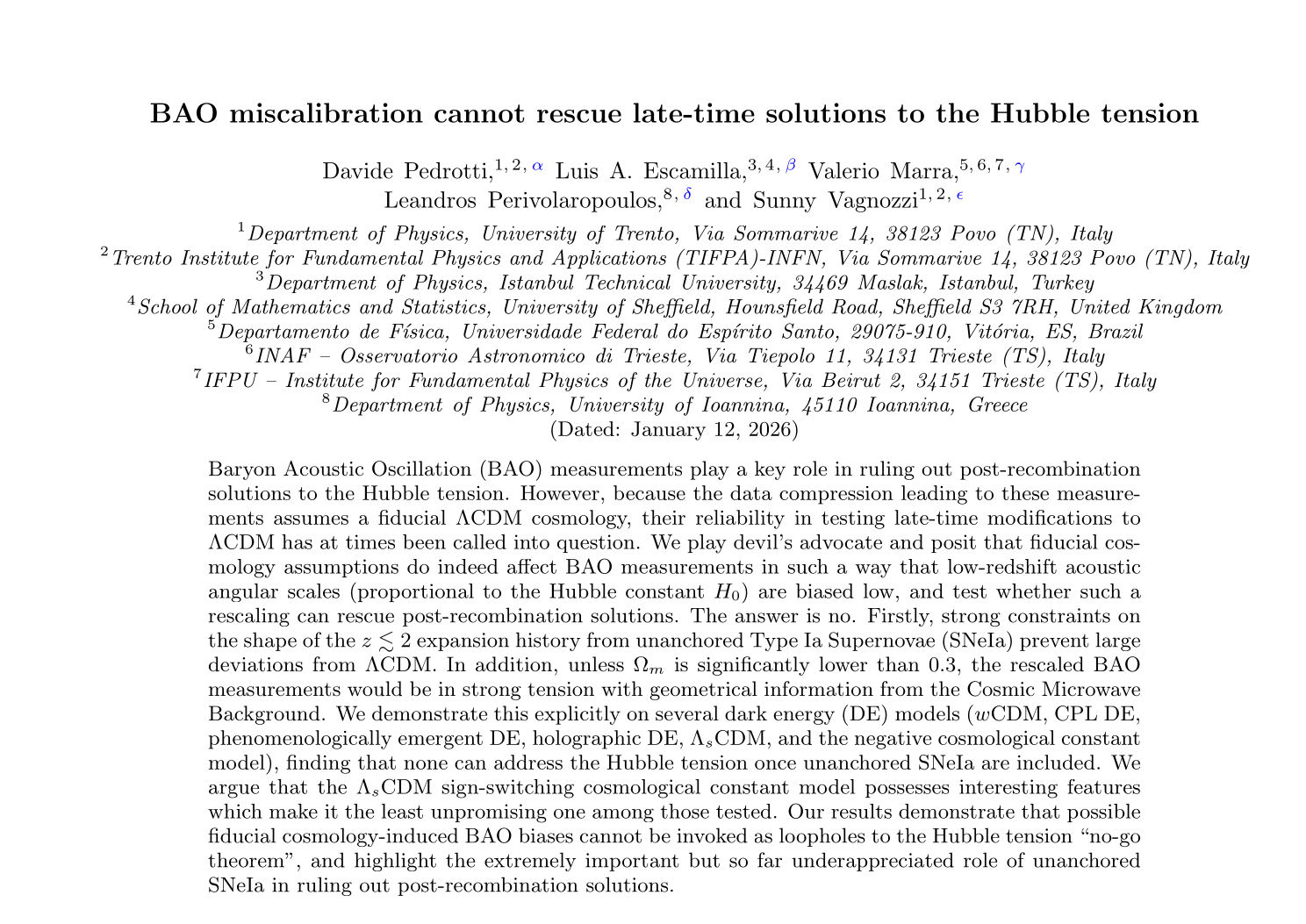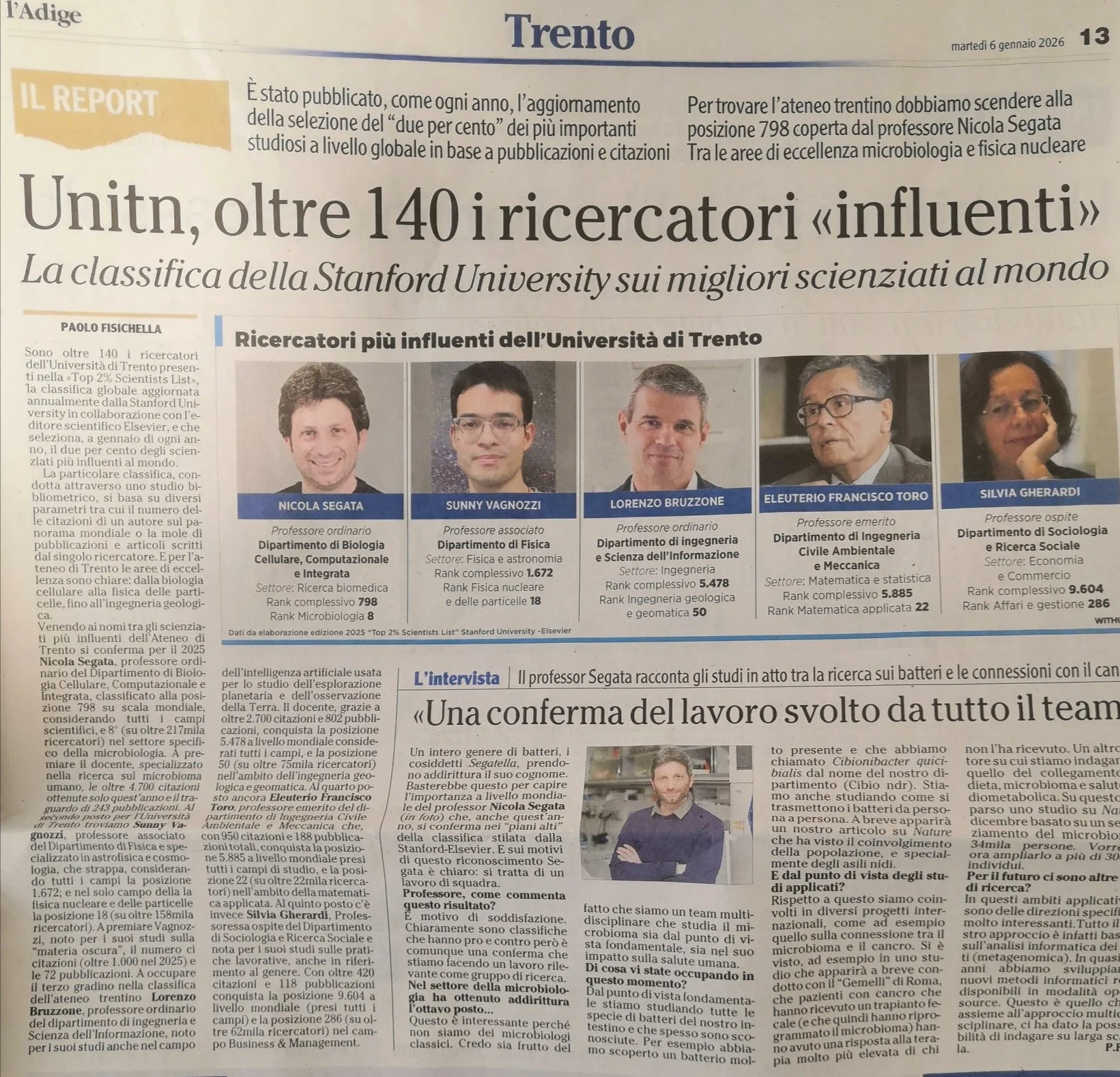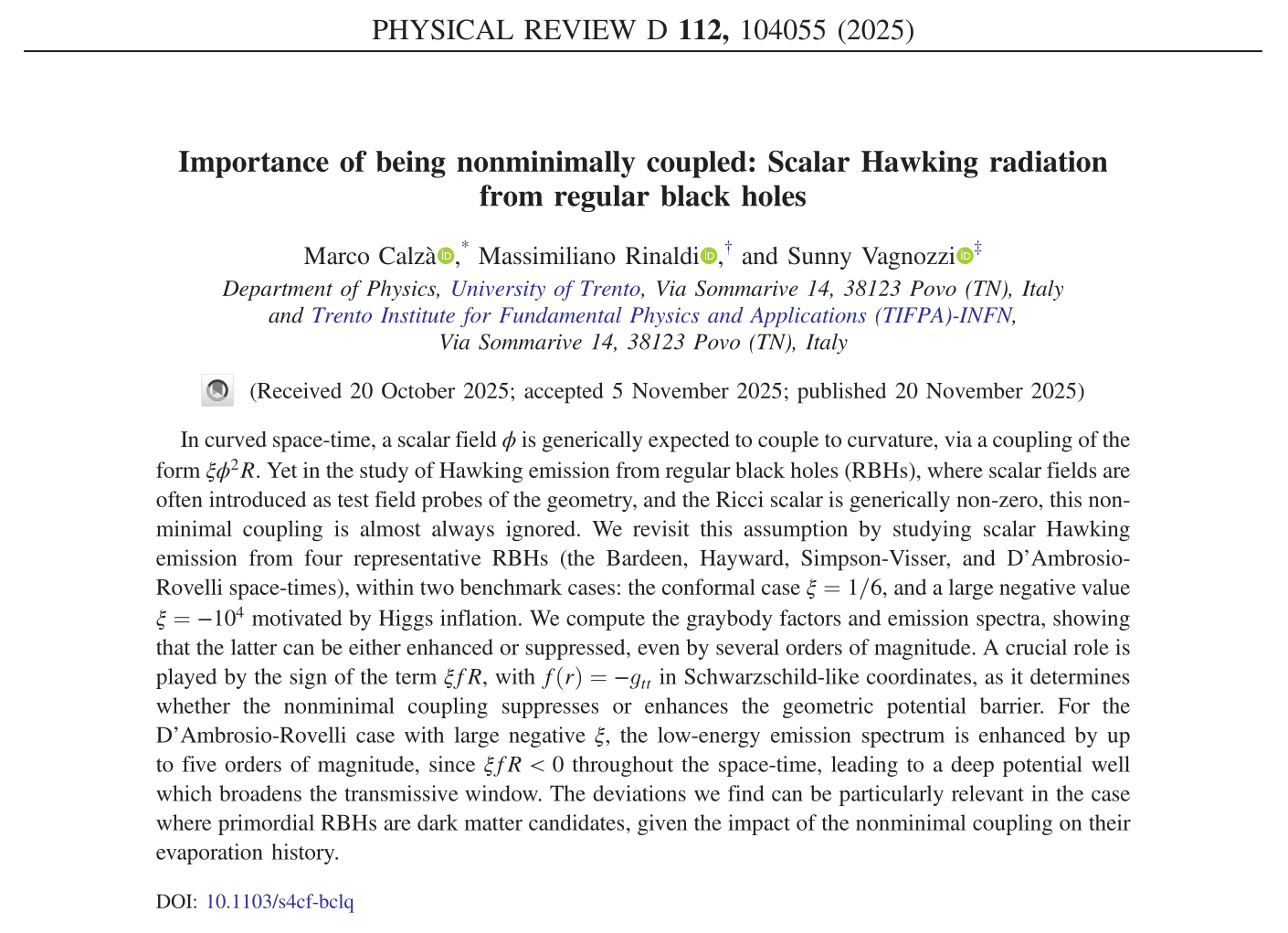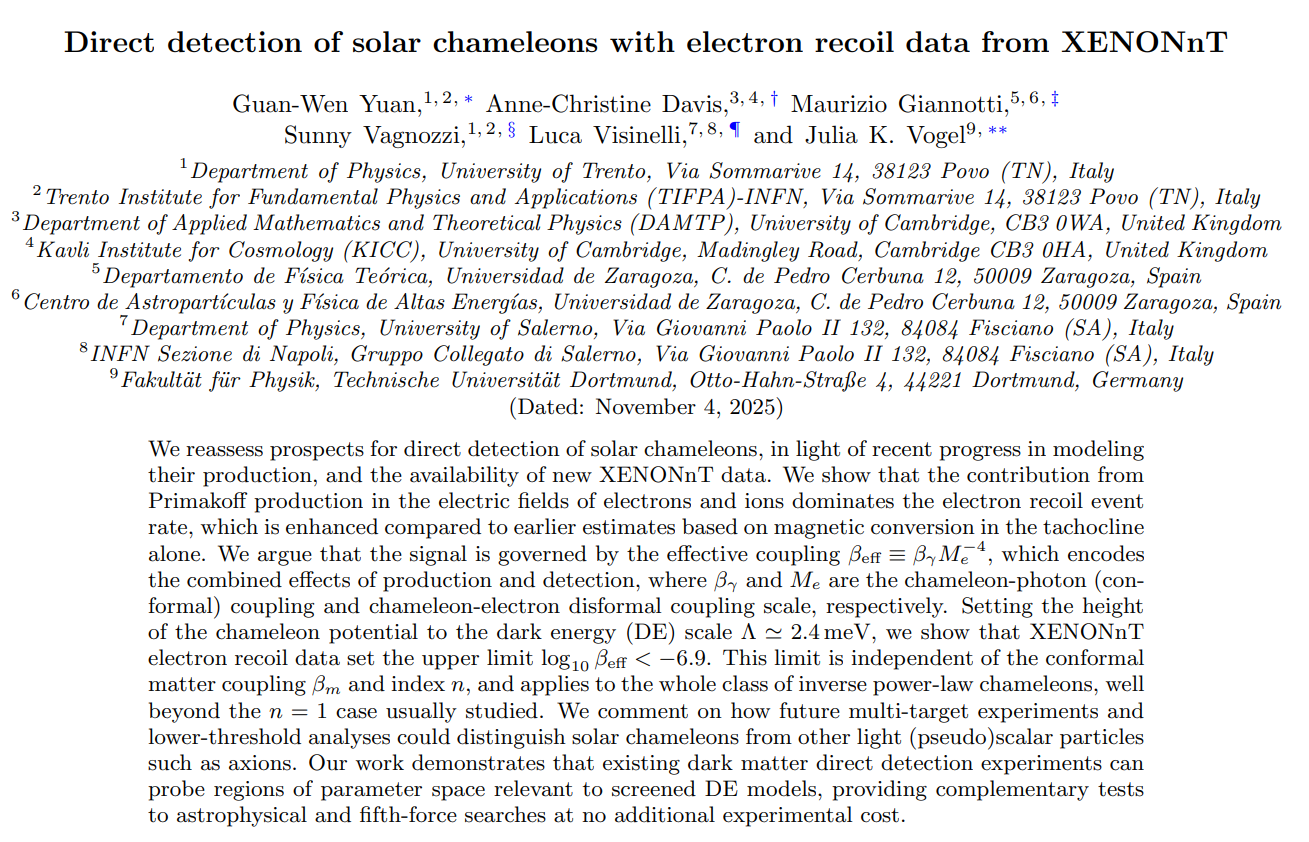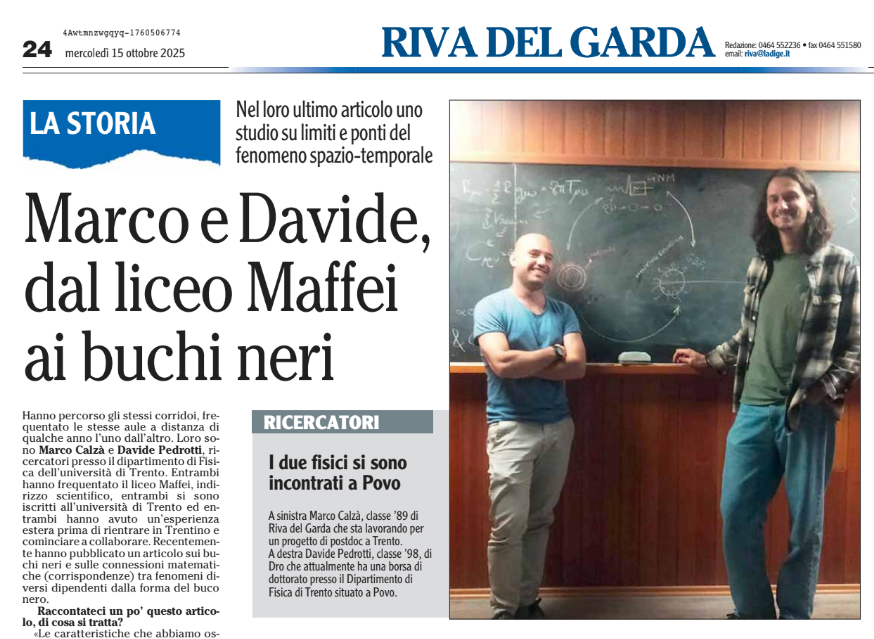My paper with Davide Pedrotti, Luis Escamilla, Valerio Marra, and Leandros Perivolaropoulos, where we show that the “Hubble tension no-go theorem” forbidding purely post-recombination solutions is robust against a possible miscalibration of BAO measurements, while highlighting the very important role of unanchored SNeIa (see this earlier news item), has now officially been published in PRD, where it has been selected as an Editors’ Suggestion (see this earlier news item)! The full bibliographic coordinates for the paper are Phys. Rev. D 113 (2026) 043507. Here is the link to the paper (which is published Open Access).
Edvig Selimaj joins my group!
Today Edvig Selimaj officially joins my group, and will be carrying out his Master’s thesis under the supervision of myself and Miguel Sabogal. We plan to work on non-parametric reconstructions of the expansion history in light of state-of-the-art cosmological datasets, and then apply a number of machine learning methods to these reconstructions to learn more about dark energy. Welcome Edvig, and I’m looking forward to our work together!
Gruppo 2003
As of today, I’m honored to be a member of Gruppo 2003! This is a group which brings together some of the most influential Italian scientists (including for instance Giorgio Parisi, here is the full list of members), with the aim of improving the far from ideal situation of scientific research in Italy. The group is also responsible for the online journal Scienza in Rete, and holds a certain political influence. Needless to say I’m honored to have been invited to join the group, and I hope I’ll be able to give my contribution to improving the state of research in Italy!
BAO and Hubble tension no-go theorem paper selected as Editors' Suggestion in PRD!
My paper with Davide Pedrotti, Luis Escamilla, Valerio Marra, and Leandros Perivolaropoulos, on the implications of a possible BAO miscalibration for the Hubble tension (see this earlier news item), recently accepted for publication in PRD, has also been selected as an Editors’ Suggestion! These make up a small fraction of outstanding papers judged by PRD’s Editors as being particularly important, interesting, and well written, and are highlighted on the journals’ homepage. Great news for a paper which I do not hesitate to place among the top 3 most important papers I ever wrote!
BAO and Hubble tension no-go theorem paper accepted in PRD!
My paper with Davide Pedrotti, Luis Escamilla, Valerio Marra, and Leandros Perivolaropoulos, where we show that the “Hubble tension no-go theorem” forbidding purely post-recombination solutions is robust against a possible miscalibration of BAO measurements, while highlighting the very important role of unanchored SNeIa (see this earlier news item), has been accepted for publication in PRD! Compared to the earlier version there were very minor changes to Fig. 5 and Fig. 10. You can read the preprint version of our paper on arXiv: 2510.01974.
L'Adige piece on influential researchers in Trento
Today l’Adige, the main regional newspaper of Trentino-Alto Adige, wrote a piece (available only in their printed version) on the most influential researchers at the University of Trento, motivated by Ioannidis’ top 2% scientists “ranking” (covered, with all the very relevant caveats, in this earlier news item - the specific ranks should really be taken with a cauldron of salt!), with my name among those explicitly highlighted together with Nicola Segata, Lorenzo Bruzzone, Eleuterio Francisco Toro, and Silvia Gherardi. A scan of the article is available here.
Primordial regular black holes (part 3) paper published in PRD!
My paper with Marco Calzà, Davide Pedrotti, and Guan-Wen Yuan, which represents the third chapter in the primordial regular black holes saga (see this earlier news item), has now officially been published in PRD! The full bibliographic coordinates for the paper are Phys. Rev. D 112 (2025) 124015. Here is the link to the paper.
Visit by Francesca Vidotto
Today we have the pleasure of hosting Francesca Vidotto, visiting us from Madrid! Francesca is currently a senior researcher at IEM-CSIC, and is a recognized expert on (loop) quantum gravity. She will be delivering a talk by the title of “All you wanted to know about black hole remnants and never dared to ask”. Welcome Francesca!
Hawking radiation from regular black holes paper published in PRD!
My paper with Marco Calzà and Max Rinaldi, where we study Hawking radiation from regular black holes in the presence of a non-minimal scalar-curvature coupling (see this earlier news item), has now officially been published in PRD! The full bibliographic coordinates for the paper are Phys. Rev. D 112 (2025) 104055. Here is the link to the paper.
Visit by Marc Sarzi
Today we have the pleasure of hosting Marc Sarzi, visiting us from the Armagh Observatory and Planetarium. He works on extragalactic astronomy, particularly regarding integral-field spectroscopy aimed at studying the ionized gas content of nearby galaxies. He will be delivering a talk by the title of “Probing Environmental Drivers of Galaxy Evolution in the Fornax Cluster”. Welcome Marc!
Pietro Fracca's BSc defense
Congratulations to Pietro Fracca, who today successfully defended his BSc thesis, by the title of “A beginner’s introduction to the ΛCDM cosmological model” (with the opponent being Prof. Valter Moretti)! In his thesis which I supervised, Pietro reviewed and showed the effects of the 6 ΛCDM cosmological parameters on the main cosmological observables (CMB and matter power spectrum), a work far from trivial for a BSc student.
Primordial regular black holes (part 3) paper accepted in PRD!
My paper with Marco Calzà, Davide Pedrotti, and Guan-Wen Yuan, which represents the third chapter in the primordial regular black holes saga (see this earlier news item), has been accepted for publication in PRD! Compared to the earlier version there were minor changes to further discuss the cosmological and astrophysical role of PBHs, such as the regular ones (ZLMY PBHs) we study. You can read the preprint version of our paper on arXiv: 2507.02396.
Visit by Michael Zantedeschi
Today we have the pleasure of hosting Michael Zantedeschi, visiting us from the University of Pisa! Michael is currently a postdoc at the University of Pisa, and years ago was a student at the University of Trento, after which he did his PhD in Munich with Gia Dvali. He is a recognized expert on the topic of black holes, especially the memory burden effect, which he was one of the first to seriously work on. He will be delivering a talk precisely on the topic by the title of “Evaporating black holes: how the burden of their memory stabilizes them”. Welcome Michael!
Clarivate Highly Cited Researchers 2025 list
I’m beyond honored to have been included in the Clarivate Highly Cited Researchers 2025 list! Each year, this award by Clarivate recognizes those who over the past eleven years have demonstrated significant and broad influence in their fields of research, roughly including the top 0.1% of the most influential researchers. Out of 104 total researchers based in Italian institutions, this year as many as 7 researchers from the University of Trento made it into the list, which is one of the highest figures in Italy, itself rather impressive considering we are a medium-sized University: see this UniTrentoMag piece. While this award officially recognizes the impact of my research, I stress that this would not have been possible without the contribution of my outstanding collaborators, so a huge thanks to all of them, including my amazing research group in Trento!
Hawking radiation from regular black holes paper accepted in PRD!
My paper with Marco Calzà and Max Rinaldi, where we study Hawking radiation from regular black holes in the presence of a non-minimal scalar-curvature coupling (see this earlier news item), has been accepted for publication without changes in PRD! You can read the preprint version of our paper on arXiv: 2510.12257.
Solar chameleons and XENONnT
Very happy to see my latest paper with Guan-Wen Yuan, Anne Davis, Maurizio Giannotti, Luca Visinelli, and Julia Vogel out on arXiv - kudos to Guan-Wen who did all the heavy lifting! This paper is essentially a merger of two previous papers of mine: in 2021 Luca, Anne, and I argued that dark matter direct detection experiment such as XENON1T could detect chameleons, light particles potentially related to dark energy, produced in the Sun (see paper in PRD), whereas later in 2024 some of us drastically improved the model for solar chameleon production, which was previously grossly incomplete to say the least (see paper in PRD and this earlier news item). What we did here was to combine the tools built in these two papers, applying the results to newer and much more sensitive data from XENONnT, and confirming the extremely important message that terrestrial dark matter experiments are well suited to probe screened dark energy at no extra experimental cost. We clarified various previously unclear points, and derived a new upper limit on a combination of chameleon couplings (specifically the conformal coupling to photons and the disformal coupling to electrons), valid for essentially all values of the chameleon power-law index n, making it one of the most widely applicable chameleon bounds to date. You can read the results in the preprint we just posted on arXiv: 2511.01655.
Miguel Sabogal joins my group!
I’m super excited to welcome my new PhD student Miguel Sabogal to my group! Miguel, who is originally from Colombia, previously did his MSc in Brazil at the Federal University of Rio Grande do Sul under the supervision of my friend and colleague Rafael Nunes, working broadly on tests of fundamental physics from cosmological data: with me, he will keep going in this direction, with an eye in particular to cosmological tensions. Miguel already has an outstanding publication record, with several high-impact, original, and extremely interesting publications, including a PRL. Many of my colleagues I’ve spoken to think of Miguel as the potential future of cosmology in Latin America, and I am excited that he chose to join my group. Welcome Miguel!
Associate Professor
After having passed my tenure evaluation in June, today is officially my first day as (tenured) Associate Professor! Except for more money, more teaching duties, more responsibilities, and my title changing from Dr. to Prof., nothing really changes in my everyday work, which means I’ll still try to get as much research done as possible.
Hawking radiation from regular black holes
New paper with Marco Calzà and Max Rinaldi out today, making it yet one more paper 100% produced within the Theoretical Gravitation and Cosmology Group led by myself and Max! We study the issue of Hawking radiation from regular black holes (BHs): most, if not all, of the regular BH solutions usually studied are non-vacuum solutions, i.e. their Ricci scalar R is non-zero. In this case a possible non-minimal coupling of scalar fields to curvature, strongly motivated by QFT in curved space-time considerations, can become relevant, yet has almost always been ignored. What we showed is that including this non-minimal coupling can drastically alter the resulting Hawking radiation spectrum, even by orders of magnitude, leading to potentially observable effects. You can read our results in the preprint we just posted on arXiv: 2510.12257.
Marco Calzà and Davide Pedrotti are on l'Adige!
Today l’Adige, the main regional newspaper of Trentino-Alto Adige, put out in their printed version (which, I admit, I had to recover from a trash can next to a bar since I was one day late!) an extremely nice piece on Marco Calzà and Davide Pedrotti, their early years (they went to the same high school in Riva del Garda, though during different periods), how their paths crossed in Povo, and their works on black holes (the piece should be visible here). Very nice to see local newspapers giving visibility to our young researchers!
